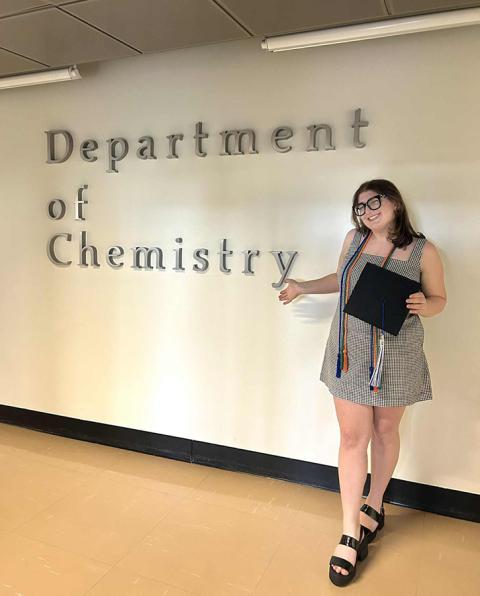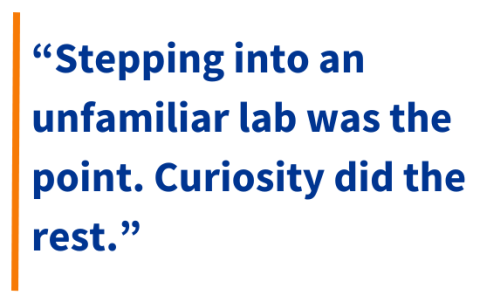Doing It Scared

Photo courtesy Seana Murray (UNH '25)
Madigan Jennison wasn’t planning on being a scientist. She followed a family tradition and attended the University of New Hampshire, beginning her studies in 2021. During her sophomore year, she trained as an emergency medical responder. Her desire to help people seemed a natural fit for a career in medicine, but she found herself drawn to the science behind that care.
UNH's status as an R1 research enterprise offered ample lab opportunities. As Madigan put it, "There's so much research all around you that it's really difficult not to hear about it." A microbiology major, Madigan loved the hands-on parts of science: streaking plates, isolating colonies, and figuring out what compounds were doing. But she also kept herself open to new, very different growth experiences. A summer research opportunity in chemistry professor Nathan Oldenhuis's NATO Lab was both daunting and exhilarating, and she jumped at it.

Funded in part through NSF EPSCoR's NH BioMade project, the NATO Lab wanted to explore how DNA could be used like a building block in new biomaterials. Traditional academic labs, especially the few chemistry labs working with DNA, can’t produce enough DNA to meet the demand for experiments at the scale the NATO Lab planned to run. The solution? Swirling bioreactors, liters of lysis solution, and chromatography.
Madigan helped run the pipeline from healthy bioreactor growth to the purified DNA the team could use in experiments. Mentored by graduate student Wynter Paiva, the NATO Lab encouraged questions and autonomy: "What do you think you should try next?" which only strengthened Madigan's judgment and confidence.
Progress came through "small clicks," not one big breakthrough: the first end-to-end run that worked, recognizing the shape of a good chromatogram, realizing when a step was overloaded, and knowing how to fix it. Teaching the workflow to another student was a turning point; explaining each step cemented that knowledge.
These small clicks built durable habits—accuracy and precision, SOPs and careful notebooks that make results repeatable, cross-disciplinary communication, and a calm demeanor in troubleshooting.
Today, Madigan applies these habits and skills in her position at the New York State Department of Health as an APHL–CDC Infectious Disease Fellow in the Diagnostic Immunology Lab.
She splits her time between testing patient samples for diseases like measles and building new tests, including a new tool to detect tularemia, a rare but highly infectious bacterial illness spread through tick bites, infected animals, contaminated water, and airborne bacteria.
When asked what advice she has for students who may similarly feel unprepared for a research lab, Madigan offered this: "Begin anyway, even if you're scared. Ask questions, write it down, fix what doesn't work. The habits you build in the lab will keep opening doors."
Support for the NH EPSCoR New Hampshire Center for Multiscale Modeling and Manufacturing of Biomaterials (NH BioMade) Project was provided by the National Science Foundation's Research Infrastructure Improvement Award #1757371.
